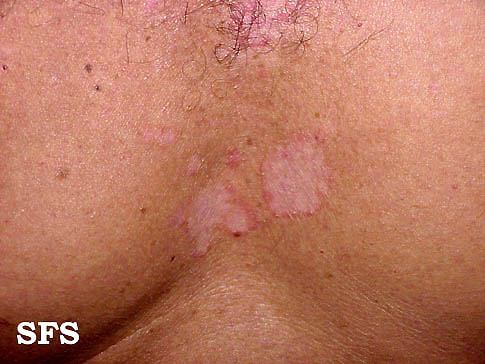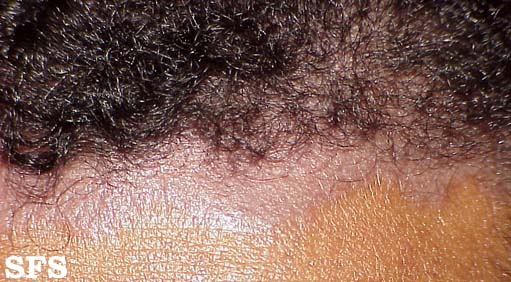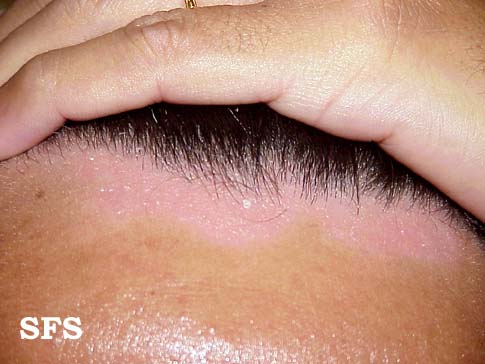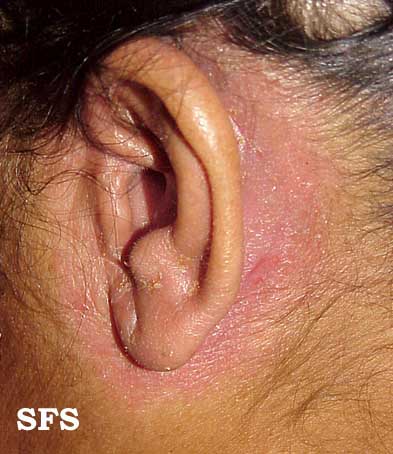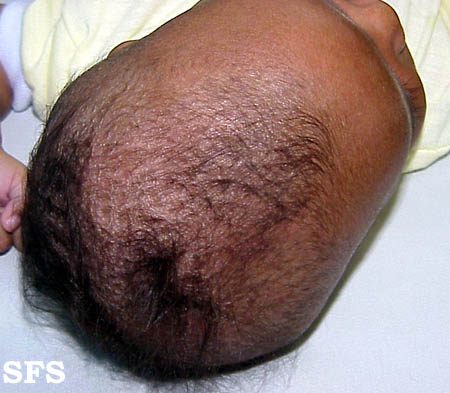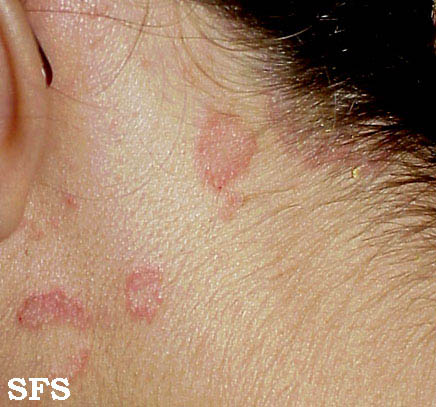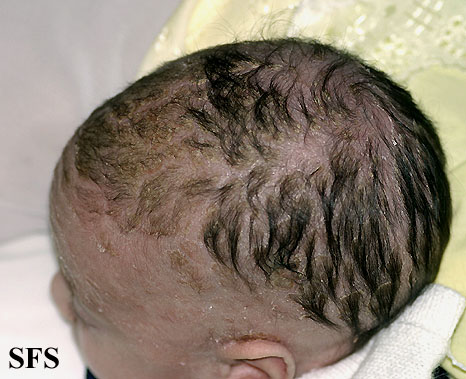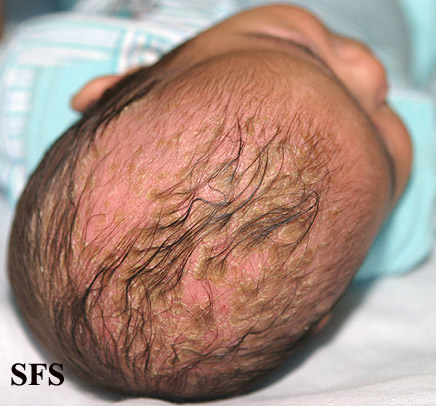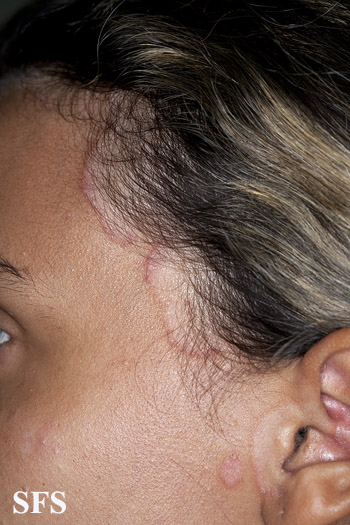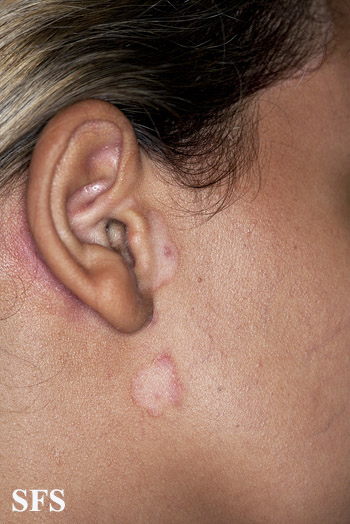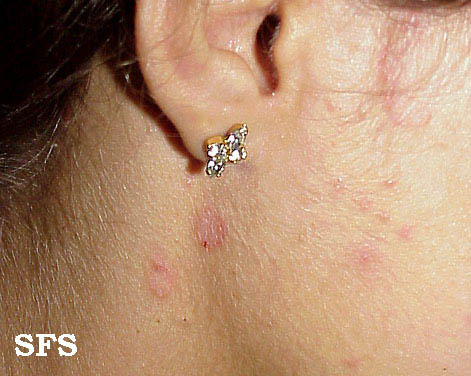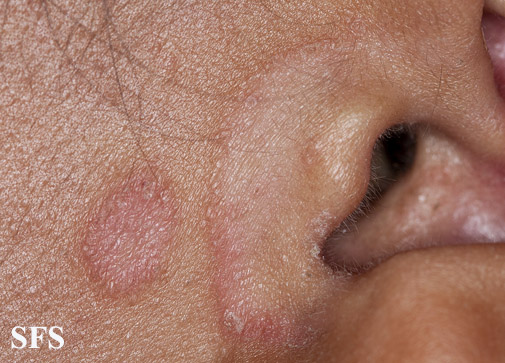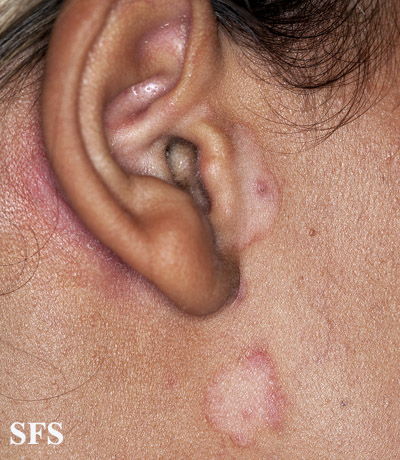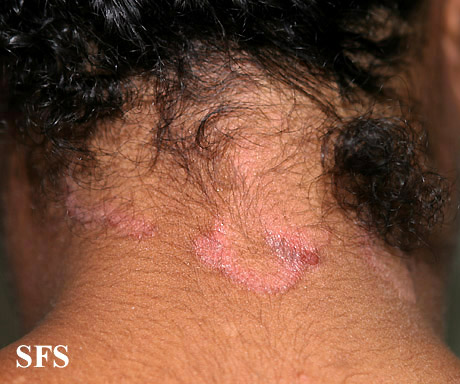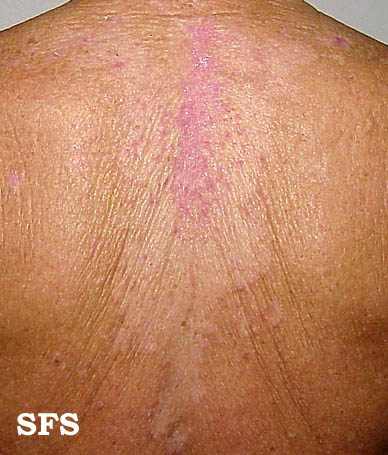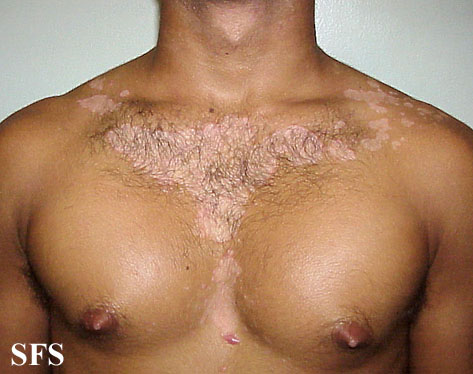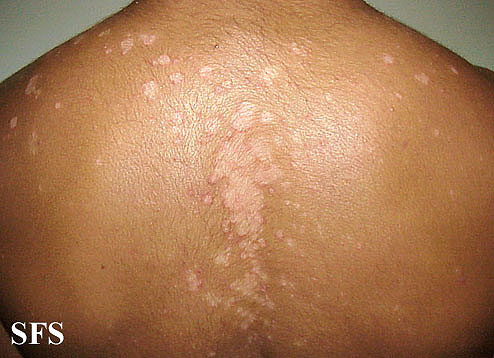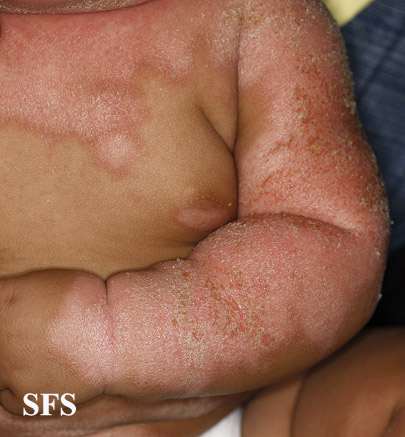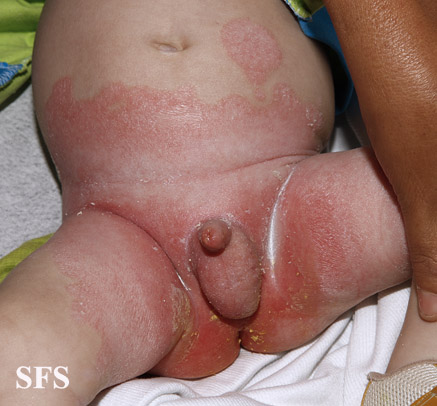Seborrhoeic dermatitis: Difference between revisions
| Line 6: | Line 6: | ||
==Overview== | ==Overview== | ||
Seborrhoeic [[eczema]] (also known as Seborrheic dermatitis [[American English|AmE]], '''seborrhea''') is a skin disorder affecting the scalp, face, and trunk | Seborrhoeic [[eczema]] (also known as Seborrheic dermatitis [[American English|AmE]], '''seborrhea''') is a skin disorder affecting the scalp, face, and trunk. Seborrhoeic dermatitis causes flaky, itchy, red skin and temporary hair loss. It particularly affects the [[sebum]]-gland rich areas of skin. Causes of seborrhoeic dermatitis include ''[[Malassezia furfur]]'' (formerly known as Pityrosporum ovale), as well as genetic, environmental, hormonal, and immune-system factors. Medical therapy for seborrhoeic dermatitis includes [[antifungal]] agents, [[corticosteroids]], and lithium salts. | ||
==Causes== | ==Causes== | ||
Revision as of 19:45, 25 August 2015
Editor-In-Chief: C. Michael Gibson, M.S., M.D. [1]; Associate Editor(s)-in-Chief: Jesus Rosario Hernandez, M.D. [2].
Synonyms and keywords: Seborrheic eczema.
Overview
Seborrhoeic eczema (also known as Seborrheic dermatitis AmE, seborrhea) is a skin disorder affecting the scalp, face, and trunk. Seborrhoeic dermatitis causes flaky, itchy, red skin and temporary hair loss. It particularly affects the sebum-gland rich areas of skin. Causes of seborrhoeic dermatitis include Malassezia furfur (formerly known as Pityrosporum ovale), as well as genetic, environmental, hormonal, and immune-system factors. Medical therapy for seborrhoeic dermatitis includes antifungal agents, corticosteroids, and lithium salts.
Causes
The cause of seborrhoeic dermatitis remains unknown, although many factors have been implicated. The widely present yeast, Malassezia furfur (formerly known as Pityrosporum ovale), is involved,[1][2] as well as genetic, environmental, hormonal, and immune-system factors.[3][4] A suggestion that seborrhoeic dermatitis is an inflammatory response to this yeast has yet to be proven.[5] Those afflicted with seborrhoeic dermatitis have an unfavourable epidermic response to the infection, with the skin becoming inflamed and flaking.
In children, excessive vitamin A intake can cause seborrhoeic dermatitis.[6] Lack of biotin,[7] pyridoxine (vitamin B6)[7][8] and riboflavin (vitamin B2)[7] may also be a cause.
Hair loss
Side effects to inflammation may include temporary hair loss. If severe outbreaks go untreated for long periods of time, permanent hair loss may result due to damaged hair follicles.
Expect two to six months before hair growth may resume.
Physical examination
Gallery
Head
Ear
Neck
Trunk
Extremities
Genitales
Treatments
Medical Therapy
- Seborrheic dermatitis[9]
- 1. Antifungal agents
- Preferred regimen (1): Ketoconazole 2% in shampoo, foam, gel, or cream
- Scalp: Twice/week for clearance THEN once/week or every other week for maintenance
- Other areas: From bid to twice/week for clearance THEN from twice/week to once every other week for maintenance
- Preferred regimen (2): Bifonazole 1% in shampoo or cream
- Scalp: 3 times/week for clearance
- Other areas: qd for clearance
- Preferred regimen (3): Ciclopirox olamine (also called ciclopirox) 1.0% or 1.5% in shampoo or cream
- Scalp: Twice to 3 times/week for clearance THEN once/week or every 2 week for maintenance
- Other areas: Twice daily for clearance THEN qd for maintenance
- 2. Corticosteroids
- Preferred regimen (1): Hydrocortisone 1% in cream areas other than scalp qd or bid
- Preferred regimen (2): Betamethasone dipropionate 0.05% in lotion scalp and other areas qd or bid
- Preferred regimen (3): Clobetasol 17- butyrate 0.05% in cream areas other than scalp qd or bid
- Preferred regimen (4): Clobetasol dipro- pionate 0.05% in shampoo
- Scalp: Twice weekly in a short- contact fashion (up to 10 min application, then washing)
- Preferred regimen (5): Desonide 0.05% lotion bid on scalp and other areas
- 3. Lithium salts
- Preferred regimen: Lithium succinate AND Zinc sulfate Ointment containing 8% Lithium succinate AND 0.05% Zinc sulfate
- Preferred regimen: Lithium gluconate 8% in gel bid on areas other than scalp
Plant-based treatments
The World Health Organization mentions Aloe vera gel as a yet to be scientifically proven traditional medicine treatment for Seborrhoeic dermatitis.[10]
- Arctium lappa (Burdock) oil[11]
- Chelidonium majus (Celandine)[11]
- Glycyrrhiza glabra (Licorice)[11]
- Melaleuca (Tea tree) species[11]
- Plantago (Plantain) species[11]
- Symphytum officinale (Comfrey)[11]
- Zingiber officinale (Ginger) root juice[11]
Related Chapter
References
- ↑ Hay R, Graham-Brown R (1997). "Dandruff and seborrheic dermatitis: causes and management". Clin Exp Dermatol. 22 (1): 3–6. doi:10.1046/j.1365-2230.1997.d01-231.x. PMID 9330043.
- ↑ Nowicki R (2006). "[Modern management of dandruff]". Pol Merkur Lekarski. 20 (115): 121–4. PMID 16617752.
- ↑ Am Fam Physician 2000;61:2703-10,2713-4
- ↑ Janniger C, Schwartz R (1995). "Seborrheic dermatitis". Am Fam Physician. 52 (1): 149–55, 159–60. PMID 7604759.
- ↑ Parry M, Sharpe G (1998). "Seborrheic dermatitis is not caused by an altered immune response to Malassezia yeast". Br J Dermatol. 139 (2): 254–63. doi:10.1046/j.1365-2133.1998.02362.x. PMID 9767239.
- ↑ "MedlinePlus Medical Encyclopedia: Hypervitaminosis A". www.nlm.nih.gov. Retrieved 2008-03-19.
- ↑ 7.0 7.1 7.2 "Seborrheic Dermatitis: An Overview - July 1, 2006 -- American Family Physician". www.aafp.org. Retrieved 2008-03-19.
- ↑ "eMedicine - Nutritional Neuropathy : Article by R Andrew Sewell". www.emedicine.com. Retrieved 2008-03-19.
- ↑ Stevens DL, Bisno AL, Chambers HF, Dellinger EP, Goldstein EJ, Gorbach SL; et al. (2014). "Practice guidelines for the diagnosis and management of skin and soft tissue infections: 2014 update by the infectious diseases society of America". Clin Infect Dis. 59 (2): 147–59. doi:10.1093/cid/ciu296. PMID 24947530.
- ↑ "WHO Monographs on Selected Medicinal Plants - Volume 1: Aloe Vera Gel". www.who.int. Retrieved 2008-03-18.
- ↑ 11.0 11.1 11.2 11.3 11.4 11.5 11.6 "The Green Pharmacy: New Discoveries ... - Google Book Search". books.google.com. Retrieved 2008-03-19.
